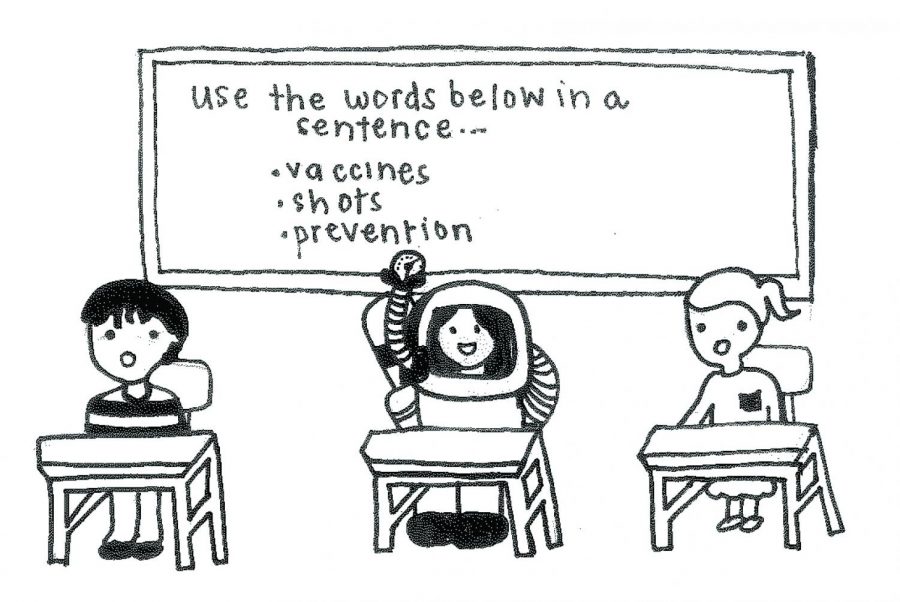As vaccination debate continues, new cases arise
Measles Outbreak Currently, those most at risk of getting the disease are unable to receive certain vaccinations.
Split second pain for a lifetime of immunity against the most common diseases is nothing short of a miracle. Vaccines, the most influential scientific development in recent decades, put an end to a parent’s worry about common diseases such as smallpox, polio, and even tetanus.
Early developers of vaccines became heroes to parents and children alike. Edward Jenner and Jonas Salk went down in history for saving millions of lives by creating the smallpox and polio vaccines respectivly.
The heroes who created vaccines were soon questioned. Dr. Andrew Wakefield published a study in the journal, Lancet, linking autism to the Measles, Mumps, and Rubella (MMR) vaccine. For years, mothers had speculated about the safety of vaccines when about a month after receiving the MMR vaccine, some children began exhibiting developmental delays, a known sign of autism. Wakefield’s study proved the mothers’ fears correct, causing the fear of few to become the fear of many.
In 2010, the paper was retracted as epidemiological studies proved Wakefield’s research to be false. The National Institutes of Health explains how autism develops when a child is around one, the same time the child receives the MMR vaccine. The link between the vaccine and autism was fabricated by the specific circumstances of the test subjects.
Although Wakefield’s study was proven false, the fear of vaccines as “dangerous,” still spread. In response, about 1.3% of children in the United States in 2015, did not receive the recommended vaccines, the Centers for Disease Control and Prevention (CDC) reported.
“Yet instead of feeling relieved that I could rule vaccines out as a potential cause of autism, I felt cheated. I couldn’t accept the truth: In the 15 years since my brother’s diagnosis, no one had figured out what caused autism, so there was nothing I could do to prevent having an autistic child. I held on to my opposition, figuring I should avoid vaccinating my future kid ‘just in case.’ I wanted to believe that I could control whether my future kid would be autistic or not,” former antivaxer Kashana Cauley remembered.
Parents and families merely hope for something to blame in the face of uncertainty. Parents need to be reassured that their fears are understood. “Each case is different. Some people believe incorrect things such as vaccines are linked to autism. Others are worried about multiple shots. Addressing each concern is the key,” Dr. Falk of Atrium Pediatrics stated.
When doctors take the time to explain the necessity and safety of vaccines, the patient’s health benefits. “I was very ignorant at the time when I started my research and didn’t even know where to begin, or what questions to ask, as my doctors and nurses for many years had never properly informed me of the risks when I was Vaccinating my own children and myself in the 80’s and 90’s.” said a post from an anti-vaxxer on Facebook. “It was then that I learned Vaccine ingredients were extremely dangerous and had never been studied for such basic things as carcinogenesis, mutagenesis, and impairment of fertility even though they contained all of these things” However, the CDC ensures vaccines are safe for the majority, requiring countless regulations and testings before a vaccine is brought to market.
The U.S. Food and Drug Administration (FDA) begins testing before the vaccine is sent to the manufacturer. If approved, the the vaccine is sent to trial. When the trial demonstrates that the vaccine is safe for humans, the vaccines are tested in volunteer groups. Testing ceases immediately if the vaccine is proven dangerous or unviable. “Only if a vaccine’s benefits are found to outweigh its potential risks does the FDA grant a license for the vaccine, allowing it to be used by the public,” the CDC reported.
Following extensive tests, the FDA grants a license for a vaccine. Even when the vaccine is sent to doctors to be put into use on patients, the vaccine is carefully monitored for any further side effects. If a side effect is presented, the Advisory Committee on Immunization Practices (ACIP), made up of practicing health professionals, choose how to proceed in recommending the use of the vaccine in question.
The amount of testing and constant
surveillance required on a vaccine ensures no unnecessary risks are being taken by any member of the population.
The increase of unvaccinated children and the commonality of seemingly “eradicated” diseases is correlated, leading to outbreaks of diseases doctors have not seen in years. Proven since the beginning of vaccine creation, when people begin to refuse vaccines, an outbreak is inevitable. “Vaccines can sometimes eliminate an infection (smallpox) but usually the pathogen is in the environment and you can only protect people with vaccines” Dr. Falk said.
In 1873, Stockholm experienced a smallpox outbreak in the wake of citizens fighting for individual rights, stated the Immunization Coalition of Delaware (ICD). The ICD also found that in 1980, Sweden deemed the whooping cough eradicated, deciding to no longer require the vaccine. This caused 60% of children to contract the disease.
As more of the population refuse the MMR vaccine, measles has entered the world stage once again. Measles has began to make a comeback, not just in the United States, but throughout the world. The CDC now warns of measle outbreaks in Japan, Canada, and Israel.
Currently, those most at risk of getting the disease are unable to receive certain vaccinations.
“Many individuals have weakened immune systems and are at high risk of serious complications from infectious diseases, including organ transplant recipients, individuals with HIV, and those receiving chemotherapy. Even having diabetes, cancer or chronic liver or kidney disease weakens your immune system,” conveys Dr. Michael of Marlton
Artwork by Jenna Preston ‘22
Nephrology. She explained how when one receives an organ transplant, the body
tries to reject the organ. The body thinks of the organ as a “foreign entity,” sort of like a disease. The body’s automatic response to reject, to fight, the organ requires suppression, causing the body to be more susceptible to diseases, such as the measles or mumps.
Because MMR is considered a “live vaccine,” immunosuppressed patients, particularly transplant patients, are unable
to receive that specific vaccine. If one is able to get the vaccine, but chooses not to, it puts immunosuppressed patients at further risk of contracting the measles, the mumps, or rubella. Before a transplant occurs, all patients are tested to prove that they received the necessary vaccinations, Dr. Michael portrayed; “Some transplant centers may not transplant a patient that refuses vaccination and does not have antibodies to serious infections like measles.”
Furthermore, schools require vaccination histories before a student is able to enroll. One of Eastern’s school nurses, Mrs. Westervelt, explained how the only vaccination exemption one receives is a religious exemption from a child’s parents or a health exemption from a doctor’s note, but there are very specific requirements of how the letter is written.
Having two young children and working with high schoolers daily, French teacher Madame Goldthorpe realizes that, “As a teacher, vaccinations are for the protection of the other students and even the teachers themselves because everyone is then put at risk if one isn’t vaccinated. But especially the nurse because she had to deal with the kids who are sick.”
Currently, the measles outbreak has been confirmed in 23 states, including New York, New Jersey, and Pennsylvania, the CDC reported. With 14 cases in New Jersey alone, the outbreak is associated with unvaccinated travelers carrying the disease back from another country experiencing an outbreak. The person may be unaware they are infectious, as Mrs. Westerfield explained, “A person is contagious for two days before symptoms appear.”
The CDC confirmed that 82 people carried the measles back to the United States. Although the measles was dubbed eradicated from the United States in 2000, the outbreak has caused 839 reported cases in 2019 alone.
If action is not taken to protect those susceptible to the measles, the outbreak will only continue to get worse. As Mrs. Westerfield explained, “We try to educate all parents why we want kids to be vaccinated for the health of their own child and for the protection of other children.”







